#spanish language
Text
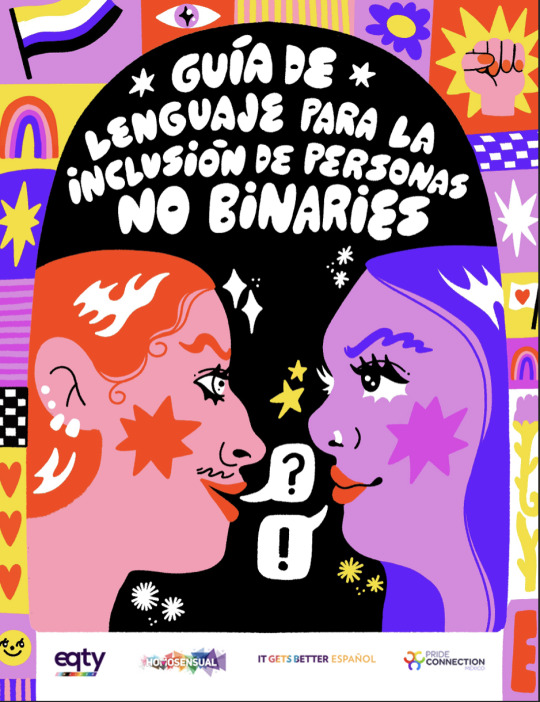
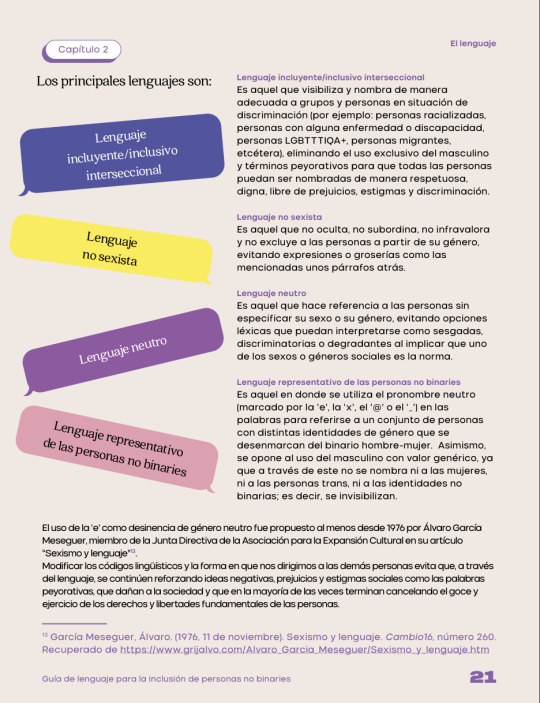

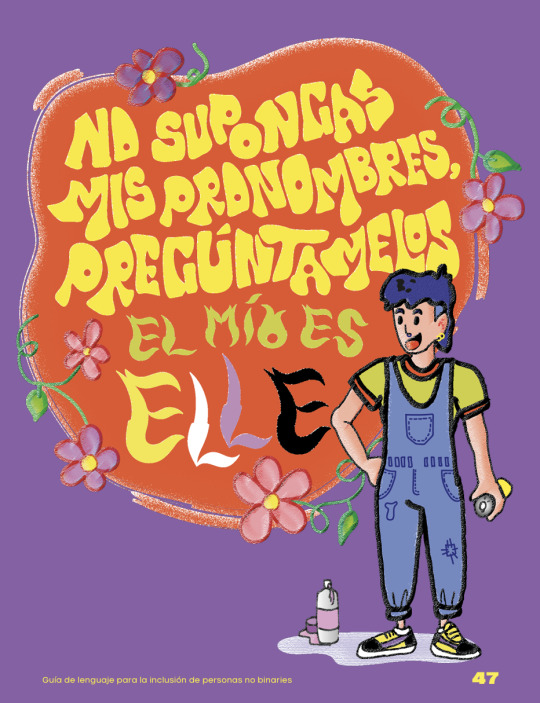
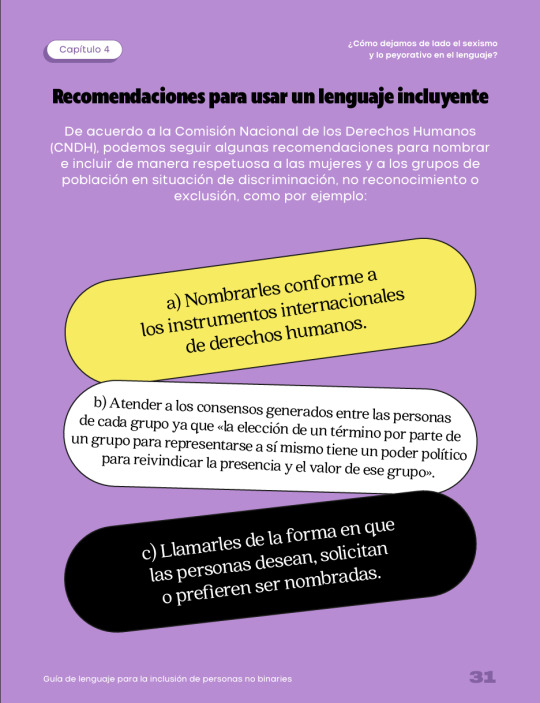
FREE downloadable guide to nonbinary language in Spanish - spread the word! 💛🤍💜🖤
How do we take a traditionally gendered language like Spanish and adapt it to be more gender inclusive?
Language is a powerful tool - this new EduGuide is amplifying non-binary voices, dismantling stigmas, and teaching us how to take a traditionally gendered language and adapt it to be more inclusive.
Our pals at It Gets Better Mexico collaborated with Homosensual to address this crucial issue within the language — download their guide for FREE and share it around to friends, family, your school, and your community: itgetsbetter.org/blog/spanish-eduguide-for-the-inclusion-of-nonbinary-people
Education like this helps create a space where every identity is seen and celebrated!
---------
El lenguaje es una herramienta poderosa - esta nueva EduGuide amplifica las voces no binaries, desmantela los estigmas y nos enseña cómo tomar un lenguaje tradicionalmente basado en género y adaptarlo para que sea más inclusivo.
Nuestres amigis de It Gets Better México colaboraron con Homosensual para abordar este tema crucial dentro del idioma — descarga tú guía GRATIS y compártala con amigues, familiares, tú escuela y tú comunidad para participar en estas importantes conversations: itgetsbetter.org/blog/spanish-eduguide-for-the-inclusion-of-nonbinary-people
¡Una educación como esta ayuda a crear un espacio donde se ve y se celebra cada identidad!
#itgetsbetter#homosensual#nonbinary#enby#genderqueer#gender neutral#gendered language#pronouns#spanish language#no binario#no binarie#latine#lgbtqia
5K notes
·
View notes
Text
spanish resource lists for learners
a list of lists!! levels are estimated.
refold has a crowdsourced resource list for spanish, curated & with notes | A1 to C2
dreamingspanish on reddit has a crowdsourced spreadsheet with over 90 channels geared towards learners | A1 to C2
learn natively has a huge deck of spanish books sorted by difficulty by learners | A1 to C2
prensa escrita has a list of news websites sorted by country & sometimes city | B1 to C1 probably
the CI wiki has an editable list of CI resources and a couple of native content links | A1 to like B2?
comprehensible hub has tons of spanish podcasts for learners | A1 to B2
letterboxd has a ton of very fun #español lists, e.g. movies mentioned in the wild project podcast, latin american female directors, made in puerto rico | ~B2 to C2
there are also a ton of moocs in spanish for intermediate to advanced learners (moocs are online courses, usually free) | B1 to C2
#spanish langblr#spanish notes#*#langblr#language learning#spanish language#perhaps this is unsurprising after my last post#we're compiling babeyyyyy
225 notes
·
View notes
Text
*gripping bathroom sink* every foreign accent is a sign of bravery, every foreign accent is a sign of bravery-
362 notes
·
View notes
Note
Idk if you’ve talked about this before, but in the event where ren and akechi are playing that shooting game together there is a very funny interaction and my fellow shuake fans and I are unsure what it means.
In English, Akechi jokes that he’s practicing gunplay to take ren out. Clearly this could either be a murder joke or a date joke. In Spanish, he apparently uses a phrase that can only mean a date.
What does he say in japanese? Was it ambiguous there too or was it clearly a murder joke or date joke? Again, sorry if you already explained it lol
…also this is kinda awkward but was the usage of the term gunplay intentional or does it have multiple meanings and fanfic has just ruined me orrr…
Hello! I am so happy to be able to go over this with you. Many thanks to @platinumdream, @minkhollow42, @somethingpersonarelated and the r/spanish subreddit for verifying this one for me.
This line stands out because the Japanese and English (and also the Spanish) translations are all radically different—different enough that what we have here is a stellar example of "the Xerox effect".
Let's take a look.
the scene in japanese

Akechi
気付いた? そうだよ、いつか君も懐に忍ばせたこれで⋯
kizuita? sou da yo, itsuka kimi mo futokoro ni shinobaseta kore de...
[lit. you noticed? that's right, some day <see below>...]
Let's take a quick look at the grammar of this line, which I think is dual-meaning in Japanese just as it was in English (and if any of this seems like bullshit please get in touch, as it never ends well when I try to produce sentences of my own):
Akechi does not finish this sentence—he's left off the verb. So, as often happens with him, his meaning is ambiguous. Let's take the obvious one first:
いつか君も懐に忍ばせたこれで【ある】
itsuka kimi mo futokoro ni shinobaseta kore de [aru]
Some day you, too, will have one of these concealed in your pocket.
Short and sweet: "I carry one of these, concealed, and some day you will too". Note that there's nothing here about practicing, as there is in the English.
But there's another possible meaning here:
いつか君も懐に忍ばせたこれで【撃ってあげる】
itsuka kimi mo futokoro ni shinobaseta kore de [utte ageru]
Some day I'll [shoot] you, too, with this thing concealed in my pocket.
WELP. Like I say, I'm not entirely sure, but I do think the strong likelihood is that this dual meaning exists in Japanese.
I should say I don't think there's necessarily a suggestion here that he carries an illegal gun (though since Naoto has one in P4, it's very possible)—I think it's a metaphorical pocket, his inventory in the Metaverse.
Though I don't think this is really what's going on, there are also a startling number of idioms with futokoro that suggest embracing....
but what is the futokoro?
Idiomatically speaking, 懐 futokoro often translates pretty cleanly as "pocket". But something else is going on: your futokoro is explicitly your breast pocket.
Originally, it was the flap in the front of your kimono where you tucked things away. And so it also appears in a lot of idioms relating to the bosom, or the heart. 懐に飛び込む futokoro ni tobikomu is to throw yourself into someone's arms. 懐に入る futokoro ni hairu, for instance, means to worm your way into someone's affections, or to win someone's confidence—sound familiar at all?
But there's something else going on, of course, with Akechi concealing a weapon in his breast pocket:

Yep. Here's the payoff for this line in rank 5. Akechi tucks that silencer away in his breast pocket—just like he told Joker he would. And then he laughs. So did he know at rank 5 that this was going to happen, or did he bring this up for some other reason? Well, you decide.
By the way, here's Joker's question about gunplay:
Joker
撃ち慣れてる?
uchi nareteru?
Are you used to gunplay?
The Japanese just means "Are you used to shooting guns?"—I'm not sure it has any of the more, er, fanfic connotations of the English "gunplay". @specterthief agrees there doesn't seem to be any innuendo to the Japanese line.
the scene in english

Akechi: Ah, you noticed? Well, I'll need as much practice as I can get if I'm going to take you out.
Let's look at what's happening here, because it happens very often. Like much of Akechi's dialogue, this line in rank 5 was originally a double entendre—it has a very obvious, and relatively innocuous, meaning, but if you squint, you can see Akechi is hinting at something far less innocuous.
Wordplay of this kind takes a lot of time, thought and skill to translate. So what happens in practice is that the translator has to choose one meaning to put front and centre. The English translator has decided, very reasonably, that Akechi's implied "I will kill you" is more important than the joke about the concealed weapon.
To be clear, this was probably the right call. I love the relative subtlety of the Japanese and the 11/20 callback, but it's important that people playing the game understand what's going on—even if, over here in blorboland, it's clear that He Would Not Fucking Say That.
the scene in spanish
Do sit down.

Akechi: ¿Te has dado cuenta? Bueno, tengo que practicar todo lo que pueda si quiero invitarte a salir.
Now, I need to be as up front as I can possibly be about the fact that I do not speak Spanish. But I know a lot of people who do, and they have responded with one voice:
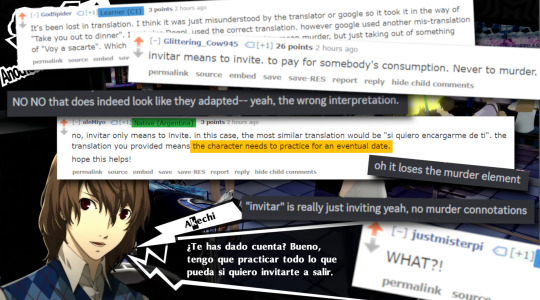

...
"Ask you out"? "ASK YOU OUT"?????
This is what is meant by "the Xerox effect".
We start in Japanese, with the relatively subtle "I have a concealed weapon", which becomes "I'm going to shoot you with a concealed weapon" if you think about it a little more. Then, in English, we become more blatant, with "take you out" having the up front meaning that Akechi will shoot Joker; rather than being subtext, it's now the point of what he's saying. And it's introduced something new—the alternate alternate meaning, of "take you out [on a date]".
It is possible that the Japanese line has a third meaning, very similar to this reading of "take you out"—you would have to torture the context here to get dating from the English, in the same way you'd have to torture the Japanese to get embracing from it.
But there's no torture in the Spanish. Oh, no. Spanish Akechi, as they say, just fucking goes for it. and why the hell not.
but what happened here?
The Spanish localisation is an indirect translation, translated not from the Japanese original, but from the existing English translation. It retains any and all errors in the English script because of this. And when the Spanish translator looked at this line of Akechi's, they saw not the original Japanese dual meaning, the one the English translator saw, but the one the English translator introduced—the dual meanings of the English "take you out".
And the Spanish translator, again, had to choose which of Akechi's seeming dual meanings to keep. Should they keep the line about shooting Joker? Or should they keep the line about taking Joker on a date?
Just like photocopying a photocopy, detail and accuracy are progressively lost, and errors accumulate. Of course, these indirect translations are not without their positives—translating from English allows for a far wider range of translations to be done quicker and more cheaply. Without them, far fewer languages would see official translations at all.
Also, it's really funny and that Spanish translation is a gift.
revision history
click here for the latest version.
v1.1 (2024/01/11)—confirmed no innuendo on uchi nareteru.
v1.0 (2024/01/10)—first posted.
#asks#persona 5#p5 meta#translation#japanese language#spanish language#(what)#shuake#goro akechi#ren amamiya
234 notes
·
View notes
Text
if you’re writing a miguel story PLEASE don’t use google translate, it’s not very accurate and makes spanish speakers cringe reading
there are many people on here (like me :]) willing to help translate for you, just message us and we’ll get back to you when we can
also please keep in mind that there are different variations of spanish, i speak latin american spanish (argentina) and miguel speaks mexican spanish but i can try help
also there are more accurate ways to translate such as spanishdict
in conclusion you shouldn’t be afraid to reach out for help translating :)
also pls tag me in all your fics ty ❤️❤️❤️
my contribution 🥰










#miguel o'hara#miguel o’hara angst#miguel o’hara fluff#miguel spiderman#miguel o'hara angst#miguel o’hara x reader#miguel o’hara smut#miguel x reader#miguel#spanish language#spanish#argentina#translator#tag me in your fics pls#ily#stayhealthy
398 notes
·
View notes
Text
Spanish Media/Input Recommendations?
Can you guys comment me some good media/input recommendations for someone learning Mexican/Spain Spanish? I' talking about any and all that you guys find interesting, whether you learned Spanish on your own or it's your native language!
Books
Podcasts
Tv Shows
Movies
Youtube channels
Songs/Musical Artists
Favorite Spanish teachers/tutors on Italki
Literally anything!
Thank you guys <3
#spanish studyblr#spanish langblr#spanish learning#spanish language#spanish#langblr#langblog#language tips#language learning#foreign languages#languages#language studyblr#language study#language goals#learn spanish#italki#spanish podcast#spanish books#university student#college student#español#mexican spanish#student life#student#college studyblr#college studyspo#language resources#language blog#languageblr#language learning tips
92 notes
·
View notes
Text
Emotions (Spanish)
love = amor
worried = preocupado
angry = enojado
sad = triste
embarassed = avergonzada
afraid = asustado
kind = tipo
happy = feliz
amazed = asombrado
delighted = encantado
bored = perforado
tired = cansado
sensitive = doloroso
hate = odio
#langblr#spanish#spanish langblr#spanish vocab#spanish vocabulary#spanish emotions#emotions vocab#learning languages#learning spanish#spanish learning#studyblr#notes#flashcards#spanish flashcards#spanish studyblr#vocab#vocabulary#spanish words#language#spanish language#learn spanish
376 notes
·
View notes
Note
Just discovered while talking to someone in Spanish that "Adiós" is more of a permanent goodbye, something you might say to someone you expect to never meet again, like a stranger. Instead, he said I should use "nos vemos" when speaking with people I know, which makes sense. I was wondering what other goodbyes I could use that aren't permanent? Obviously there's "hasta luego" and "hasta mañana."
I wouldn't go that far necessarily, but yes adiós can be used for people you don't expect to see for a long time (possibly never again like sayonara means in Japanese)
Literally, adiós is "go with God" which would have been a lot more impactful in the time of needing to journey days/weeks/months to meet some relatives, and possibly having to deal with war, disease, wild animals etc
A lot of Western langauges have something similar, even "goodbye" is "God be with you/ye"
Some people do use it for a permanent goodbye. Others use it for an indefinite but probably long period of goodbye
And some people just say adiós as a standard goodbye with no deeper meaning other than "bye"
Note: You can also say adiosito which I wouldn't necessarily recommend outside of friendly conversation since it can sound sarcastic; it's like "toodle-oo" but it's literally a little goodbye
Note 2: If you vehemently hate someone and you hope to never see them again, you can say hasta nunca which is like "see you never" and I think that's beautiful
-
Today people do use adiós just as "goodbye" though it can read as "we won't see each other for a while"
The more short-term is nos vemos "we will see each other"
Another variation is a direct object version rather than reflexive. You can say te veo pronto "I'll see you soon" for example, instead of nos vemos pronto "we will see each other soon", that sort of thing
-
There's also hasta pronto "see you soon", hasta la próxima "see you next time"
And a lot of people have adapted certain words into Spanish like bye/bai or chau/chao for goodbyes
chau/chao in particular comes from ciao and is super common especially in South America
Another common one I say is cuídate "take care of yourself" / cuídese for polite, cuídense for plural
Depending on context you can also say ¡Suerte! "Good luck!" (or ¡Buena suerte! or ¡Que tengas mucha suerte! "Hope you have lots of luck" or te deseo mucha suerte etc)....
Another common one I say is ¡Ánimo! which means something like "Chin up!" but literally it's "energy" or "cheer"; if you're saying ánimo with someone you're essentially saying ¡Aguanta! or ¡Resiste! which is like "Hang in there!" or trying to pep someone up, where animar is "to cheer someone on" so it's all related there
-
Also I know you said spoken but just in case, if you're signing off on a letter/email there are some basic phrases you can use:
saludos = (a generic kind of goodbye) [lit. "salutations" or "regards"]
un cordial saludo = (something like "kind regards")
atentamente = "yours truly" / "sincerely" [lit. "attentively"]
estamos en contacto / estaremos en contacto = "we'll be in touch"
And if you're writing a friendly letter you can say abrazos or besos for "hugs" and "kisses" respectively; it's very common to say something like te mando un abrazo "I'm sending you a hug" or something like that
-
Also, if you're at a party or something, you can say something like ya me voy or me largo or something like "I'm heading out"
I tend to say something like hora de irme "time for me to go" because in my English-speaking brain saying me largo feels awkward like I'm storming out but I know that's not what that always means
Additionally you can say debo irme "I should go", something along those lines is pretty standard
-
If you're being funny, I think me piro vampiro is somewhat used in Spain (but maybe not so much now)... it's just there for the rhyme. Literally "I'm out, vampire" or "I'm leaving, vampire" [pirarse is an idiomatic way of saying "to leave"]
For Latin America, more common would be chao/chau pescao which is literally "goodbye seafood/fish" since pescao is an informal spelling of pescado where the D can kind of be aspirated
You may also see/hear chao/chau bacalao "goodbye cod"
Again, all for the rhyme. The equivalent of "see you later alligator" in English. Everyone loves a rhyme
But obviously only do this among friends because it's informal and a bit childish
#followers?#learn spanish#spanish#spanish vocabulary#langblr#language#languages#spanish language#long post
383 notes
·
View notes
Note
I’m sure I’m not the first person to have thought about this, but I think Simon speaks in Spanish to Wille sometimes and Wille finds it really sexy.

55 notes
·
View notes
Text
YR fanfic pet peeves (and corrections): latin america edition
so. i was originally going to post this in january as a kind of "new year, new opportunity to learn about simon's hispanic heritage" kind of a thing, but life got busy, and then my computer died and i lost my original list, so i've had to reconstruct this from memory as best as i could. there may be some stuff missing, so perhaps i'll just keep adding to this post as missing/new points come to mind.
disclaimer 1: if you've included any of the points made here on any fanfic of yours, please don't take this as a call-out. this isn't intended to shame anyone, but rather as an educational opportunity. it's very rare that a latin american nationality that is not mexican or colombian or puerto rican is showcased in an international show, especially outside of the US, and it's given me such joy to have all of you lovely folks make the effort to be open to and research and understand the idiosyncrasies of simon's (and omar's) heritage because the rest of latin america tends to go overlooked in most other fandoms. so i don't intend to scold anyone with this. we can't all know everything about every other culture-- lord knows i don't know everything about sweden, but i want to be respectful to the country and its people and that is why i heavily research anything i don't know and ask people who do know when my research doesn't quite cover it and am open to corrections when even that falls short. i expect most of you come to write about simon's family background in good faith and also want to be respectful to his family's culture, and so i thought i might make things a bit easier for you all by putting the most common errors/misunderstandings i've seen in one handy post. but once again, it's not a call-out, i don't get offended by these things, and i'm in no way implying, if you've done any of these things in fic or in life, that you are a bad person. i understand people make mistakes when they don't know things.
disclaimer 2: i am not venezuelan myself. i was born and raised in the same general region of latin america, though, and i have venezuelan friends and have worked with venezuelan people and have visited venezuela. generally speaking, i feel their culture is very similar to mine (though our spanish is much closer to spanglish than theirs is, haha xD) and feel a deep kinship with them. but of course, i'm no native, and if you're venezuelan and catch anything here that you feel is incorrect, feel free to point it out and i'll add a correction in your name.
warning: this is very long. christ almighty. DX if you can't make it to the end, tl;dr-- feel free to ask if you have any questions or if anything isn't clear. my ask box/messages are always open.
1- "mijo." this is the only one that legit has caused me to click out of several fics/chapters, at least in the beginning, but i've learned to grin and bear it by now. it's not so much that it's wrong, per se, but rather it's more of a location issue. "mijo" is, to my ears, very much a mexican (or, if you stretch it, northern triangle) slang. it IS used sparingly in other countries, but rarely used unironically. instead, if you hear the term used in the caribbean region of latin america (which my country is part of, as is a large part of venezuela), it's almost always used… let's say sarcastically. for example, if your grown-ass adult friend is being a dumbass and doing something reckless, you might call out "oiga, mijo, se va a romper el cuello" ("hey, mijo, you're going to break your neck"). basically, it's a way of calling someone immature like a child. it doesn't have to be ENTIRELY unaffectionate (kinda like the way someone might call their significant other "idiot" or "dummy" but mean it endearingly. in fact, in colombia it's way more common for spouses to call each other "mijo/a" than it is for them to call their children that), but you can also use it with complete strangers-- like if someone cuts sharply into your lane while you're driving, you might yell at them "oiga, mijo, a donde le enseñaron a manejar, en un potrero?!" ("hey, mijo, where did you learn how to drive, in a horse paddock?!"). but even in these sarcastic/neggy cases, it's rare. and EVEN RARER to hear a mother call her children "mijo" or "mija" in this region. it's just not a thing. so when i read it in fanfic, it immediately takes me out of the story because it's so weird to me that linda would sound mexican-- it's a very distinctive accent, which carmen gloria 1000000% does not have. (plus, "mijo" in spanish is a type of birdseed. so it gave me a chuckle the first few times i read it in a fic because i always have that brief second of confusion where i go "why is linda calling simon birdseed?" before it clicks. xD i'm a dork.) it's much more likely that linda would just say "hijo" or "mi hijo," instead.
1b- the way you decide on whether to use "hijo" or "mi hijo" is important because "mi hijo" can sound overly formal in the modern context especially, much like it would in english. in fact, you can use the english version of it, "son" vs "my son" to guide you on which of the two to use. like for example, if linda were to say directly to simon "i love you, my son," she would sound oddly old-timey and anachronistic, so you would just use "son" ("hijo") in that case. whereas if she's talking about simon with someone else, for example saying "i told my son to be here on time," you'd be perfectly okay to use "mi hijo" in that sentence in spanish. it's very transferable in that case.
2- speaking of non-transferable, though, you can't use "cariño" in all instances you would use "sweetheart" or "sweetie." it really depends on the grammatical construction, and it can be tricky to get it right, but it depends on whether you're using it as a direct address or as an object. for example, if you're using it in place of someone's name-- say, a mother telling her child "te quiero, cariño" ("i love you, sweetheart/sweetie") is perfectly fine, because in that case, she could also say "te quiero, hijo" ("i love you, son") or "te quiero, simon" ("i love you, simon"). but if, say, simon says to wille "you're my sweetheart," you would not use "cariño" there; you'd go instead with some syrupy way to say "boyfriend," like "eres mi novio" or "eres mi enamorado" or even "eres mi amor," and if sara tells felice "you're a sweetheart," that would also not involve "cariño" at all. in addition, "cariño" is also very rarely used in plural; if linda is using a term of endearment for both her kids, or for a group of teens her kids' age, she would use a different term of endearment altogether: "hola, mis amores" ("hi, my loves"), "hola, bebés" ("hi, babies") or "hola, mis tesoros" ("hi, my treasures") among some examples. one exception is when you say "cariños míos" ("my sweethearts"), but very rarely the plural by itself. in fact, "cariño" is often slang for gift or present, especially in the diminutive-- for example, if you go to someone's celebratory party for some occassion (birthdays, graduations, baby showers, heck even christmas), you might hand them a small gift and go "te traje un cariñito" ("i brought you a small present"), and if it's more than one gift, or you're bringing gifts for several people, then you'd say "unos cariños" or "unos cariñitos" in the plural.
3- simon's skin is tan, not tanned. this… doesn't personally bug me as much because it's more of an english grammar issue, but i know people who might actually feel very offended if you get this one wrong with respect to them. "tan" is a color; a light shade of brown. "tanned" implies the original color of your skin has darkened with the sun. now, i'm sure simon can tan (lucky goat, says she whose skin burns even while indoors), but about 95% of the time "tanned" is used in YR fanfiction, it's used as a descriptor of the color of simon's skin as we see it on the show. that would imply his skin used to be lighter at some indeterminate before-time and has been darkened by the sun. this is incorrect; that is the natural color of simon's skin. so stick to "tan skin" instead (not tan PERSON, mind you. his SKIN is tan, he is not). and i would gently suggest that if you take away any single thing from this post, make it ESPECIALLY this point, as someone more sensitive than me might interpret this error as some kind of retroactive whitewashing. and i don't want anyone here to get in trouble for simply not knowing.
4- pabellón criollo is one dish, yes, but it's four different FOODS. it's not something a newbie would be able to make off of a recipe (i don't know how to make it and i've been eating it all my life), and it's not something that's likely to be taught in just one day. also, if you're bringing it to a dinner or a potluck, you're bringing four separate food containers, not just one.
4b- also, venezuelan food, for the most part, is not particularly spicy. you CAN make it spicy if you want, but traditionally, it is not. it's flavorful, maybe even saucy depending on the dish, but rarely spicy. i know the joke of white people being unable to handle spice is funny, but there's also plenty of us hispanic people who are equally terrible at it, because there's different levels of spice in the food from different regions of latin america. besides, as a friend of mine perfectly put: we are living in the 21st century now. if you can eat mild mexican food, you should be able to handle traditional venezuelan food just fine. and i'm pretty sure there's mexican food in sweden. plus, wille would probably be more used to international food-- not only does he have the means, but having traditional meals in foreign countries is kind of part of the job.
5- while i'm at it: simon is definitely half venezuelan. this is canon as of S2. there is no other place in the world where that dish is called pabellón. please keep that in mind when you're writing and researching.
5b- this, along with several of the points above, is important because it's a bit of diaspora trauma that whenever we venture outside of latin america and people learn we're latino, they immediately assume we're mexican, or that our culture and traditions are the same as those of mexican people. it happens often, and it's incredibly annoying. not that there's anything wrong with mexico or mexican people-- they're lovely, and their traditions and culture and food are fantastic-- but we are not them, and treating us like we are is reductive. the rest of latin america can be very different and incredibly diverse, and it can be dispiriting when people treat us like we're all the same. so that is why it is important when writing about simon, his family or his venezuelan roots, that you take care to actually research things as they are in venezuela, and not just pick the low-hanging fruit of latino facts you might've learned through pop cultural osmosis, which eight times out of ten will be mexican-only because most hispanic people in the US are mexican and the US exports its media all over the world. i've learned to just roll my eyes at it by now, but some people might actually feel offended or hurt, and i'm sure nobody here intends for that to happen.
6- although simon speaks spanish, neither he nor sara nor his mother nor any aspect of his mother's culture is spanish. "spanish" is what people from spain call themselves. people from spanish-speaking latin american countries are not spanish; we are hispanic, or latino/a/e. "latinx" is… let's call it controversial, at least outside of the US. most people born and raised in latin america don't like it; i personally don't get offended if people use it, but i don't use the term myself. also, you can say "latin food" or "latin music," but we usually don't refer to PEOPLE as latin, but rather latino/a/e. if in doubt, just use latin american or hispanic. they're also conveniently gender neutral.
EDIT: @andthatisnotfake also brought up a very important point: "if you spell it latinx, it makes it harder for screen readers to read (or so I've been told) and some people depend on those, so there's another reason to avoid it." (the unpronounceability of that term is at least part of the reason why hispanic people who live in latin america don't like it.)
6b- never use "the latino/a" on its own to refer to people. "latino/a/e" is an adjective, not a noun, so you would say "the latino boy" or "the latino man" but never just "the latino." kinda like it would be weird to point out the one japanese man in a room as "the japanese." there are some nationality/ethnic terms that just don't work as nouns in english.
7- spanish is not simon's one native language-- or at least not any more than swedish is. he grew up in a mixed-race household, speaking two different languages. it's pointless to call spanish his native language when comparing it to swedish. both are his native languages. also, while we're at this, wille is probably at least bilingual (i'm assuming he can speak at least english), although he only has one native language. it's hardly a competition between the two boys as to who's more of a polyglot.
7b- simon wouldn't take classes on the spanish language-- like to learn how to SPEAK the language-- since spanish is one of his native languages. he wouldn't take them at hillerska, nor in university, nor elsewhere. he wouldn't be allowed. you're literally not allowed to take classes on your native language, nor get credit for said classes. trust me, those would've been an easy extra 24 credits for me in college if that was a thing.
EDIT: have been made aware (thanks, @rightsogetthis and @plantbasedfish!) that at least in sweden and in finland one IS allowed to take classes of your non-swedish/finnish native language, in certain circumstances. i have to say, i'd be pissed if i were taking my french classes alongside a french native speaker, but hey, the system's the system, i guess. ;) so i've struck this one out.
8- dear god please don't use google translate for your spanish translations. listen, i'm not judging-- i do it with other languages, too, when i'm in a pinch. but google translate is literally The Worst (tm) so i always try to either check with someone, or stick to the stuff i already know is correct. seriously, you don't want to know the kinds of crazy stuff GT can spit out that people actually put out in the real world; some of them are quite hilarious. if you're unsure, my ask box/messages are always open and i looooove helping people with this kind of thing, hispanic language and cultural stuff. i know it seems like i'm hardly around, but i do check my messages. don't be shy, even if it's something really small.
PS: while i'm talking pet peeves, malin is wille's bodyguard, not his butler. she's nice enough to attend to him at hillerska because there's no other palace staff around and she's literally stationed outside his door, but she wouldn't do that in the actual palace. there's other staff for that. she wouldn't even guard him at the palace, i don't think, because the royal palaces in sweden are guarded by the royal guard, not SÄPO. if anything, malin might spend the time while wille is in the palace grounds at a gatehouse (like in YR 2x03 and onwards) or at some kind of security office in the palace, and then get called whenever wille needs to go anywhere. she wouldn't be giving wille messages from the queen or walking guests to wille's room or anything like that. that's not her job. (sorry, i had to get that off my chest, lol.)
#young royals#young royals netflix#netflix#simon eriksson#sara eriksson#linda eriksson#omar rudberg#carmen gloria perez#latin america#latino#hispanic#latin american culture#latin culture#latino culture#hispanic culture#spanish language#i hope this is helpful#if not feel free to ignore lol
250 notes
·
View notes
Text
Learning through immersion
(Specifically Spanish, for intermediate-advanced learners. Most of this can be used for any language though)
Consume native content without looking up anything. Just enjoy it. (Something written, or something which has a transcript/subtitles)
Now consume it a second time
Write down any interesting sentences. (Ideally with pen and paper, for it to stick)
Anything that has something that looks like a word you know, but is in a tense you’re not sure, just a new use of a tense, some interesting expression or vocab…
Go onto SpanishDict and type in those interesting conjunctions, figure out what tense they’re in
Learn that new tense! Either through SpanishDict (they have lessons for pretty much everything) or just google lessons online. This can be as in depth as you like, or you can just google a quick explanation
Create new vocab list of new words and quickly run through it
Re-consume native content after going through all your sentences with a new enlightened mind
On this run you can also read aloud (or mirror, if you have audio) the interesting sentences you wrote down. With feeling, please.
Then write something in your own words, using new grammar and vocab you’ve studied. Or speak aloud, and record yourself. You should try to write other sentences using a similar structure as whatever new interesting tense use you’ve found. If it suits you, get a native speaker to check your sentences, using Busuu, or HiNative, or something similar.
This is just one way that I’ve been enjoying recently. To be honest, you can cut out pretty much any of these steps depending on what suits you, how much time you have, etc.
The important thing is that you’re paying close attention to your content, and you absolutely need to write your own sentences afterwards.
Unless you genuinely have no interest in communicating with native speakers — maybe you just want to watch tv or read in your target language and that’s fine — but if you do want to be able to communicate, you’re going to need to practice. You should also be practicing speaking aloud. If you have nobody to talk to, talk to yourself.
This strategy is really useful for when you’ve self-studied the basics of a language and you don’t know what grammar you need to study next. Just let
#i hope this is coherent#btw I skip half these steps all the time#I do think it’s important to stumble through before looking things up tho#but you can do this by just…reading a paragraph in its entirity before googling whatever vocab and grammar#also this process doesn’t need to happen in one sitting#langblr#language#language learning#spanish#spanish langblr#learn spanish#linguistics#language tips#language resources#languages#spanish language#learning languages#language learning tips#how to learn Spanish#quinn posts#100
470 notes
·
View notes
Photo
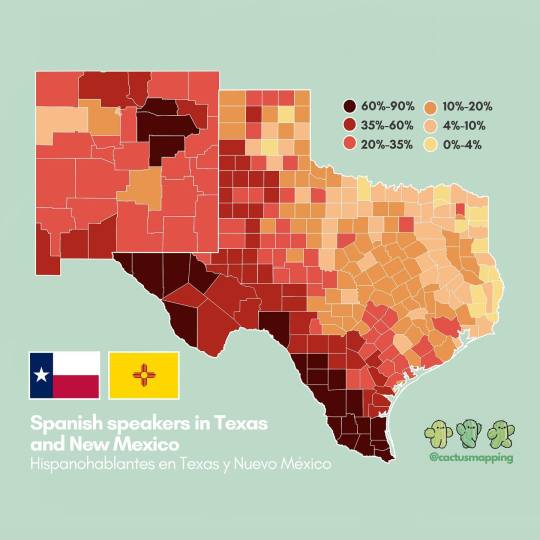
Distribution of Spanish speakers in the US states of Texas and New Mexico 🇺🇸
by cactusmapping
121 notes
·
View notes
Text


Taylor Swift saying "Mexico City, welcome to The Eras Tour!" in Spanish on August 25th, 2023 in Mexico City, Mexico (Night 2) - (x)
#taylor swift#tswiftedit#taylor swift gifs#the eras tour#tswiftgif#tswift gif#tswiftgifs#tstheerastour#the eras tour taylor swift#the eras tour latam#mexicocitytstheerastour#mexico city#mexico#ciudad de méxico#spanish language
204 notes
·
View notes
Text
Spanish comprehensible input for beginners-
(On a scale of absolute to intermediate beginner)
Muzzy in gondoland (spanish)- old, really weird. But you will learn if you watch it. Introductions, numbers, basic vocab. Very easy.
Mi vida loca BBC- more phrases than vocab. A little tougher
Señor wooly music- has a ton of free stuff on his yt that's really good. Fan made student covers fill in the gaps in his content after he pay walled some of it. You can buy a website subscription but it's expensive
Dreaming spanish- a gold mine of stories and vlogs for people of all levels, especially beginners.
Bluey in spanish- I mean, need I say more? It's really good. Ccs in spanish too, for Latin American or castillian spanish.
Spanish after hours- LAURA MI AMOR this woman genuinely seems like the nicest person. Posts mostly in spanish but has some good explanation videos in English that will really help boost your vocab. Has videos for absolute beginners, intermediate learners, and advanced learners. She's amazing. She also has authentic conversations sometimes with people.
#langblr#spanish#learning spanish#spanish language#learning languages#language learning#comprehensible input
135 notes
·
View notes
Text
Me watching the trailer to Wish
Disney: This is the villain of the story. His name is King Magnifico of Rosas. He's the bad guy but no one realizes it at first. :)
Me, someone who speaks Portuguese and Spanish: ...You named your villain King Magnificent of Roses?
Me: ...And the characters are going to be shocked that a guy who named himself "Magnificent" is a narcissistic bad guy? No one saw it coming? Really?

#brazilian portuguese#portuguese#brazil#lol#portuguese language#langblr#portuguese langblr#the real life of me#i'm just saying#spanish language#spanish#castilian#castellano#wish 2023#wish movie#king magnifico#disney movies#disney movie#disney's wish#facepalm
102 notes
·
View notes
Text
So I've been reading some Miguel O'Hara x reader fanfics,and sometimes the spanish leaves a lot to desire. That's not anyone's fault though (most of the time), I understand why some people would stick with what google translator would give you if you're going to write 2 or 3 words in Spanish. But, but, but if you want to write Miguel with a bit more long spanish sentences, specially if you want to write Mexican slang, I'm here.
This is basically an invite to everyone who doesn't know and maybe is afraid to ask a native speaker. Please ask!!, I don't bite jsjs. This is also an excuse to meet people who want to talk about the movie lol
Dejo a Miguel chiquito para no morir ignorada lol
Fanart by turrondeluxe

#miguel ohara#miguel ohara x reader#spiderman atsv#spiderman across the spiderverse#miguel o'hara#x reader#spanish language#satsv spoilers#satsv#miguel o'hara x reader#miguel o'hara x gender neutral reader
148 notes
·
View notes